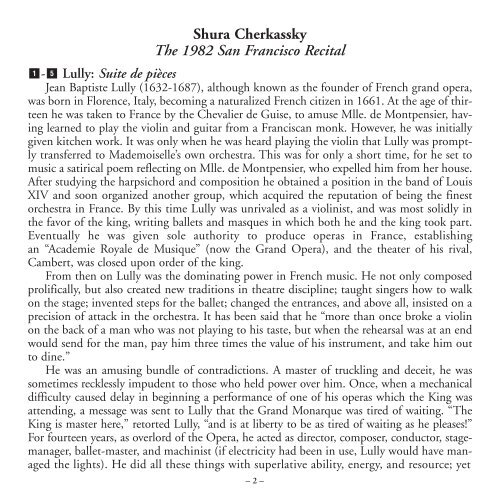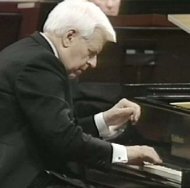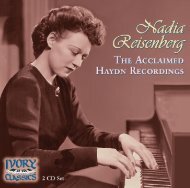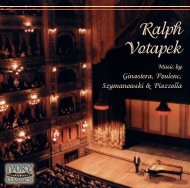70904 for PDF 11/05 - Ivory Classics
70904 for PDF 11/05 - Ivory Classics
70904 for PDF 11/05 - Ivory Classics
Create successful ePaper yourself
Turn your PDF publications into a flip-book with our unique Google optimized e-Paper software.
Shura Cherkassky<br />
The 1982 San Francisco Recital<br />
1 - 5 Lully: Suite de pièces<br />
Jean Baptiste Lully (1632-1687), although known as the founder of French grand opera,<br />
was born in Florence, Italy, becoming a naturalized French citizen in 1661. At the age of thirteen<br />
he was taken to France by the Chevalier de Guise, to amuse Mlle. de Montpensier, having<br />
learned to play the violin and guitar from a Franciscan monk. However, he was initially<br />
given kitchen work. It was only when he was heard playing the violin that Lully was promptly<br />
transferred to Mademoiselle’s own orchestra. This was <strong>for</strong> only a short time, <strong>for</strong> he set to<br />
music a satirical poem reflecting on Mlle. de Montpensier, who expelled him from her house.<br />
After studying the harpsichord and composition he obtained a position in the band of Louis<br />
XIV and soon organized another group, which acquired the reputation of being the finest<br />
orchestra in France. By this time Lully was unrivaled as a violinist, and was most solidly in<br />
the favor of the king, writing ballets and masques in which both he and the king took part.<br />
Eventually he was given sole authority to produce operas in France, establishing<br />
an “Academie Royale de Musique” (now the Grand Opera), and the theater of his rival,<br />
Cambert, was closed upon order of the king.<br />
From then on Lully was the dominating power in French music. He not only composed<br />
prolifically, but also created new traditions in theatre discipline; taught singers how to walk<br />
on the stage; invented steps <strong>for</strong> the ballet; changed the entrances, and above all, insisted on a<br />
precision of attack in the orchestra. It has been said that he “more than once broke a violin<br />
on the back of a man who was not playing to his taste, but when the rehearsal was at an end<br />
would send <strong>for</strong> the man, pay him three times the value of his instrument, and take him out<br />
to dine.”<br />
He was an amusing bundle of contradictions. A master of truckling and deceit, he was<br />
sometimes recklessly impudent to those who held power over him. Once, when a mechanical<br />
difficulty caused delay in beginning a per<strong>for</strong>mance of one of his operas which the King was<br />
attending, a message was sent to Lully that the Grand Monarque was tired of waiting. “The<br />
King is master here,” retorted Lully, “and is at liberty to be as tired of waiting as he pleases!”<br />
For fourteen years, as overlord of the Opera, he acted as director, composer, conductor, stagemanager,<br />
ballet-master, and machinist (if electricity had been in use, Lully would have managed<br />
the lights). He did all these things with superlative ability, energy, and resource; yet<br />
– 2 –














